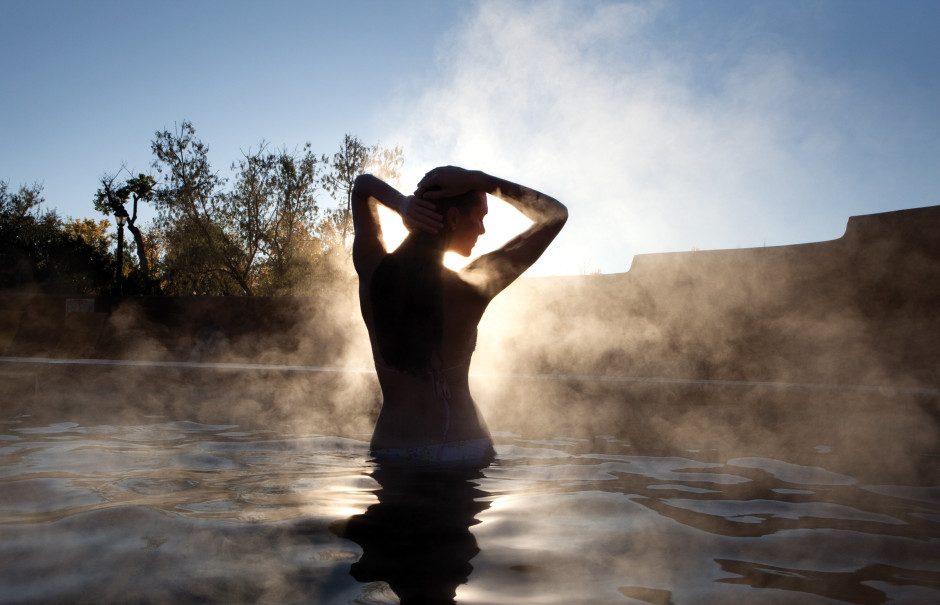
Ojo Caliente is a classic New Mexican hot springs resort about an hour’s drive from Santa Fe. The rustic spa was built on natural mineral springs where the hot water seeps up through different kinds of mineral formations to create pools that reportedly provide specific kinds of healing. Historically sacred to the Pueblo Indians, Ojo Caliente is no longer on Indian land, but the people who run it have set aside a hidden pool and other spaces solely for ritual use by Native American elders, so there’s now an easy mix of tourists, locals, and Native People. Despite arriving on an unseasonably cool day, the atmosphere felt warm and inviting.
I had reserved a private mineral pool to spend an hour with a Watsu practitioner named Iva Jessie. Watsu, or water shiatsu, is a remarkably intimate body practice invented at Harbin Hot Springs in Middletown, California, where Jesse learned the art. Before the session began, Jessie and I spent a few minutes in the warm pool, holding hands, gazing into each other’s eyes. When I felt ready, I closed my eyes and squeezed her hand. Then, for the next 50 minutes, I was supported by the warm water, buoyed by some small floats around my calves and by Jessie herself. Sometimes I felt like I was flying, and it was blissful. Other times, cradled in a maternal embrace, I found myself tearing up. Gradually, perhaps because of the way my limbs were being gently crossed and uncrossed in the water, my brain lost track of them and I experienced a remarkable feeling of floating in space without any body at all.
I experienced a remarkable feeling of floating in space without any body at all.
Jessie told me at the beginning that she was going to “rock my world,” and she did. She also gave me the strong sense that Watsu is powerful practice that — like a peyote or ayahuaska ceremony — demands a safe and sacred environment. As it turned out, I had to leave Ojo Caliente in a hurry because I’d lost track of time. I had a plane to catch a couple hours away in Albuquerque, so I tore myself away and was soon speeding through the otherworldly desert in a decidedly altered state.
As I drove, two things happened: the prospect of missing the plane got less and less worrisome, while the amount of time I had to reach the plane seemed to expand. It seemed miraculous — the kind of thing that happens when we become more attuned to the sacred energy in everything, the kind of thing that happens when we really invest in time out — as at the right kind of spa.
Editor’s Note: Watsu is no longer available at Ojo Caliente, but one may still experience the magic of its healing waters.
Stephen Kiesling
Stephen Kiesling is a writer and editor whose career was launched in 1982 with the classic rowing book The Shell Game and The New York Times Book Review, “Just as it is good that there was a riverboat pilot who could write…it is good that there is one true blue jock who can.” A Scholar of the House in philosophy at Yale, Stephen was a 1980 Olympic oarsman who also raced in the 2008 Olympic Trials. He learned journalism from T George Harris, a decorated World War II artillery scout and Time reporter who created Psychology Today. T George and Stephen launched both American Health magazine and Spirituality & Health, where Stephen continues as Editor at Large. He has written for the New Yorker, Sports Illustrated and Outside, was a spokesman for Nike, started a celebrated rowing club, and has built parks and playgrounds. He lives at Ti’lomikh Falls on the Rogue River in southern Oregon, where he writes for his wife Mary Bemis at Insidersguidetospas.com. Stephen is also the caretaker of one of America’s oldest Salmon Ceremonies and is working on a whitewater park and sculpture garden. He is interested in transformational retreats, anything to do with water, the Native American origins of our democracy, and the process of becoming what he calls an Earth-Indigenous Elder, a person who knows their own story from the beginning of time.